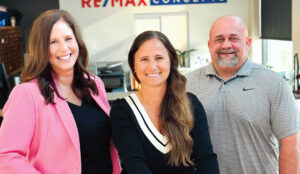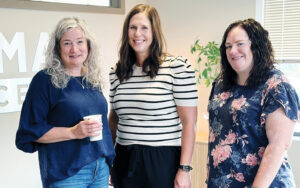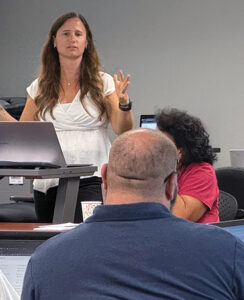A small business wellness program that is working
10/1/2025
Jaimee Moore, director of operations, Bekah Kentfield, director of agent services, and Shane Torres, a principal owner at RE/MAX Concepts (photo submitted)
Wellness programs don’t have to be all “one-size-fits-all.”
If the head office in Windsor Heights is any indication, the signs at RE/MAX Concepts point to it being a nice place to work. There is plenty of natural light, private offices, accessible conference rooms and cubby holes. New paint and the recent addition of hardwood floors in the elevators and common areas provide a modern feel. Bold motivational prints with messages like, “Work Hard. Be Nice.” provide hints into the culture RE/MAX Concepts has built, and strives toward, at its locations as a professional real estate services organization.
Limiting turnover and improving job satisfaction
A new industry report draws attention to how employers can improve both work productivity and the lives of their employees.
In recent decades, the popularity of wellness programming has expanded. Particularly in office settings, society has come a long way from the proverbial water cooler next to a coffee pot or break room. In recent years, it has become more common on some sprawling corporate campuses to find bustling employee cafes, on-site cardio centers, even auditorium-style conference centers and gymnasiums amid the rows of offices and workstations.

Michelle Kelley, director of education, Jaimee Moore, director of operations, and Megan VanArsdale, a RE/MAX Concepts transaction coordinator
But what does employee “wellness” have to do with limiting turnover and improving job satisfaction? For smaller businesses, where leaders often wear a lot of hats and spend most of their time making the company run, how can that work?
Businesses like RE/MAX Concepts are proving it is possible through implementing and monitoring what is working day after day, week after week, month after month, year after year.
Respect for employees’ work freedom and independence
Shane Torres got into the real estate industry and started with RE/MAX Concepts in 2009. He found success in the field, and, in 2016, the company was acquired with Torres becoming a principal owner alongside business partners Matt Mauro and Ou Meksay.
Their director of operations, Jaimee Moore, had already been on board as an employee for five years when the new owners started. Since then, the company has expanded to 20 locations — up from six when Torres originally started — spanning Iowa, including the Quad Cities area, and part of Illinois, and St. Petersburg, Florida.
The business has 55 full- and part-time people across all locations. Moore has watched it blossom to more than 475 independently licensed real estate agents as well.

Bekah Kentfield, director of agent services, leads a presentation for real estate agents at RE/MAX Concepts in Windsor Heights as Michelle Kelley, director of education, looks on.
The culture at RE/MAX Concepts is centered around respect for employees’ work freedom and independence. The company didn’t intentionally set out to create a “wellness” program. It just kind of happened that way. Their approach naturally evolved based on situations and the needs of their staff.
The owners and business leaders like Moore keep their ears to the pavement, have a pulse on morale, and connect with their teams daily on what is happening on the ground. It’s something the current leadership has encouraged from the start, keeping the team members aligned and knowing they are supported.
Start with communication of benefits
When Torres and team took the reins, one of the first topics that popped up was medical benefits administration. There was no formal program in place, and they soon discovered people on staff with extraordinary needs.
Moore spearheaded taking on the role, and RE/MAX Concepts brought on a partner, facilitating an annual insurance benefits offering. The company started paying a portion of the employees’ premiums. Today, managing benefits and niche wellness programming has become a shared responsibility. Moore and Bekah Kentfield, director of agency services, tag team the effort.
Providers are available year-round to speak with employees about insurance planning and help them find information about financial tools for retirement savings. Every year, a licensed professional comes in and provides information on benefits like IRAs, helping some people feel more secure.
A new role
Workplaces play a significant role in people’s lives, having an effect physically and mentally. Research shows that the pandemic helped clarify the relationship between work and “well-being.” COVID time sped up a lot of things, including RE/MAX Concept’s approach to wellness initiatives.
Like most everyone, they did not anticipate the work-from-home dynamic and other changing norms post-pandemic. The company had already been developing a hybrid model, and that was accelerated out of necessity. It became an option for employees and part of the wellness philosophy that stuck.
For Torres and the team, they found putting power in the hands of their employees, many of whom have families and different lifestyles, is the way to go. The scheme allows people to work from home four days a week with one day in the office on-site. It’s empowering, Torres said, because, on days when there is no mandatory, in-person meetings or events, employees can have greater flexibility over their own schedules and lives.
He agrees with a family-first, people-first leadership style. Staff development and hard work will always be important, he says, but not by sacrificing work-life balance. They want to foster a team atmosphere that provides that leeway without creating a negative impact on the ability to meet business needs.
Getting together
Straight forward social behaviors, like welcoming new team members, sharing meals, or helping one another with tasks, help create less isolation and greater inclusion. RE/MAX Concepts has made a conscious and consistent effort to gather together in person despite the company’s growing size and remote work options.
They foster teamwork through regular check-ins, collaborative projects, and even activities such as simply hanging out together playing arcade style video games in the café. They say volunteering creates stronger connections, too.
A staple is the onsite breakfasts hosted regularly for agents, and staff members are always welcomed, too.
There is a series of annual events employees can look forward to or get involved with. “Family day” attendance on the first Thursday of the Iowa State Fair has increased steadily over the past seven years, and “movie day” the first Saturday after Thanksgiving has been going strong for more than a decade.
Every February, staff members and their spouses or significant others are invited to the company dinner and awards party with other appreciation events and holiday parties planned annually. Additionally, Moore notes many staff members communicate daily via chat, email or phone. Monthly all-staff meetings and department meetings help ensure face time isn’t neglected.
Building traditions
Torres said he sees many companies struggle when they have given up on these types of in-person interactions and networking events. He stresses the importance of getting together in person and making families feel welcome.
When these types of activities and expectations are set around regular and periodic interactions, it doesn’t just make a business stronger, he explains, it reinforces bonds that make people feel good, contributes to their health and personal well-being, strengthens the culture even more, and makes them want to stay.
Torres said they do fun team-building exercises and personality profile workshops, too, which help employees understand their motivations and develop effective communication strategies that contribute to desired business outcomes and stronger retention.
The team has brought in massage chairs for workers, and they encourage physical fitness routines in ways that relate to their employees’ personal preferences. Whatever they want to do to keep in shape or prioritize athletics is up to them. With more than a dozen dispersed locations, RE/MAX Concepts generally lets that activity type fall into the category of individuals’ goals and how people choose to spend their time away from work.
“We try to get them together as much as possible. And, even with our size, we do a pretty good job,” Torres said.
Moore says when connection and trust become part of daily work life, wellness grows naturally across the whole business.
“Seeing them person to person matters,” Moore continues. “The balance of the two is why we have had such success.”
Meeting peoples’ needs
The research suggests employees who are happier in the workplace and feel valued are the ones who tend to perform better and stick around longer. The wellness conversation isn’t always easily definable.
On a basic level, the company wants a strong culture where their employees know they are cared for and reminded of the fact they can turn to the company for an assist in challenging times. Owners and managers can set the tone by listening to concerns and demonstrating those values through everyday interactions.
Katie Stewart, an agent services representative, shared how she was supported during a time of transition. She said she likes the work and the people. She also appreciates knowing that her voice carries weight and that the leadership wants to know her insights.
“I moved back to my home state, and instead of parting ways, Concepts offered a 100% remote position for me,” Stewart offered. “I was ecstatic to continue to work for them. One thing I value is the leadership team valuing our wellness.
“My manager will check in to make sure my workload is not too much and ask if I need help with anything, regardless of how busy she is. It doesn’t matter how busy the leadership team is, they have a willingness to help and let you know that you are heard.”
Wellness concepts
Torres and Moore said, once they become aware of a need, the company wants to be known as an employer that is willing and, when able, ready to respond and help set up support and, in some cases, provide direct assistance.
RE/MAX Concepts has supported people’s wellness journeys in ways such as helping employees who were going through difficult pregnancies. They were able to grant extended maternity leave, even prior to giving birth, easing the burden and displaying concern for the safety of mother and child. It additionally eliminated some financial worries.
A former employee faced high-risk medical issues and was turned down multiple times for insurance, and she was able to opt into the company’s plan after becoming pregnant. The company soon received letters and emails with thank yous, announcing the birth of a healthy baby.
A while back, Megan VanArsdale, a transaction coordinator, had a sudden health crisis, also meaning she would be absent from the office for a few months. A manager called immediately, assuring the company would do “whatever it takes” to make a difficult situation easier.
“I know me being out of the office for that long made things tough in the office for a few people,” VanArsdale said. “I was never treated badly for it, though. I had so much support from everyone at Concepts. That experience made me so grateful for everyone… and something I’ll always remember.”
Why people quit
The bulk of employees who decide to quit jobs don’t cite lack of compensation as the reason.
The Society for Human Resource Management points to 2024 survey data that indicates competitive pay and benefits packages should remain a priority for human resources leaders. However, more than 32% of those departing said toxicity in the workplace was a driver behind their decision to quit.
The problem with the data is that only a little more than 15% of employers noted it as a factor. Over half who quit noted “personal reasons.”
The American Psychological Association’s 2024 Work in America survey findings suggest most respondents feel they matter at work. More than 86% of respondents noted they want to know that the work they are involved with is making a positive impact on society. Nine in 10 employees agree they are proud of the work they do.
Torres noted a dedicated nonprofit organization that is 100% independent of his brokerage, was established. Concept Cares Foundation has its own multi-member board “making our local community a better place.”
That’s an avenue for making people feel good about giving back, too, not to mention an annual Thanksgiving basket fundraiser they do every year.
Torres says it is another piece of a wellness puzzle that has led to worker satisfaction and long-term employee retention.
When people are going in the same direction and are supportive of one another, smaller companies can leverage a more flexible approach, and that is more than OK.
“We don’t have a specific program per se,” Torres said. “It evolved as situations presented themselves.” ♦












